 Harri Hursti drove up to Los Angeles last Friday after his appearance that morning before the Riverside County, California, "Blue Ribbon" panel convened to investigate massive problems during the County's 2006 election, and continuing concerns from Election Integrity advocates about both the performance and security issues surrounding the Sequoia Edge II DRE touch-screen voting systems in use down there.
Harri Hursti drove up to Los Angeles last Friday after his appearance that morning before the Riverside County, California, "Blue Ribbon" panel convened to investigate massive problems during the County's 2006 election, and continuing concerns from Election Integrity advocates about both the performance and security issues surrounding the Sequoia Edge II DRE touch-screen voting systems in use down there.
We sat down to interview Hursti for a documentary film for an hour or two on Friday night, and we continued chatting into the wee hours. After getting home around 4am, we suspect we'll be playing catching up for a few days.
The headline from those discussions last night is probably that Hursti, now famous for his hack of a paper-based Diebold optical-scan voting system in Leon County, Florida, in late 2005 (as seen live in HBO's documentary Hacking Democracy), advocates digital optically-scanned paper ballots --- where the image of the scan can then be made available to all on the Internet --- as the most secure and most transparent method of voting for the type of elections we have in these United States.
That may come as a surprise to advocates of Rep. Rush Holt's Election Reform bill, who have been pointing to the "Hursti Hack" as a way to suggest that op-scan tabulation is "just as bad" as Direct Recording Electronic (DRE) touch-screen voting systems. Holt's bill (HR811) would allow for the continued use of DREs, despite the continuing warnings from computer scientists, disabilities and minority rights advocates, and the Election Integrity community that the devices should be banned.
Hursti heartily disagrees with those Holt supporters and told us again that DREs are not safe for use in elections, with or without a so-called "voter verified paper audit trail." He's asked for us to help facilitate a meeting for him with Holt and his staff to discuss the matter, and we are attempting to do just that.
As well, Hursti's position may also come as a surprise to those who have pointed to the "Hursti Hack" in their call for 100% hand-counted paper ballots (HCPB) in American elections. While Hursti said he recognizes that such a system works well enough in other countries where ballots are much simpler, he feels the thousands of ballot styles and pages and pages of candidates and propositions would likely make all HCPB unwieldy here. By contrast, he explained that in Finland, voters go to the poll and cast a single vote for President as the only race on the ballot, which is simple enough to hand count on the night of the election.
He rattled off the many different systems of democracy in many different countries, from Europe to Asia, as well as a history of how America has come to its current mess, going back as early as the late 1800's to discuss the evolution of our modern day system in this country. Clearly, he's done his homework and is well worth listening to on these matters.
Hursti also gave high marks to California's new Secretary of State Debra Bowen for her recent announcement of "red team" hack testing for all of the state's currently certified electronic voting systems, as part of her "top to bottom review" of those systems. Other computer scientists and security experts have lined up to join in praising Bowen for this unique, first-of-its-kind attempt to finally test the security of these systems.
 On the other hand, many of the state's elections officials have come out against such testing of their precious, hackable, un-transparent voting systems. And, surprise surprise, so has the Santa Cruz Sentinel --- the paper once owned by thankfully-former CA SoS Bruce McPherson --- in a laughable editorial late last week claiming that "paper ballots carry an even greater risk" than electronic voting systems, and that Bowen's planned test criteria is a "solution in search of a problem."
On the other hand, many of the state's elections officials have come out against such testing of their precious, hackable, un-transparent voting systems. And, surprise surprise, so has the Santa Cruz Sentinel --- the paper once owned by thankfully-former CA SoS Bruce McPherson --- in a laughable editorial late last week claiming that "paper ballots carry an even greater risk" than electronic voting systems, and that Bowen's planned test criteria is a "solution in search of a problem."
We're not sure what cave the Santa Cruz Sentinel has been living in, but we're guessing they've been sharing their hard tack and canned spam with their buddy, the gone-but-apparently-not-forgotten McPherson, the one responsible for certifying these god-awful systems in the first place for the state, despite mountains of evidence suggesting it was unwise. We're also guessing they've never sat down to chat with Harri Hursti.
Hursti's visit to Riverside, as we reported here last week, was in response to County Supervisor Jeff Stone's challenge last December that nobody could manipulate the county's Sequoia election system. After Hursti volunteered to take Stone up on that "1000 to 1" challenge, the county has been waffling ever since. So quite a few members of both the public and the press were on hand yesterday for Hursti's testimony before the "Blue Ribbon" panel.
Although Hursti traveled all the way from Finland, Stone and every other member of the Riverside County Board of Supervisors were apparently too busy to make it up the road to meet Hursti and listen to his presentation...


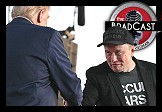 Trump Gets Trumped in Our Musky Year-End Roundtable: 'BradCast' 12/19/24
Trump Gets Trumped in Our Musky Year-End Roundtable: 'BradCast' 12/19/24 'Green News Report' 12/17/24
'Green News Report' 12/17/24
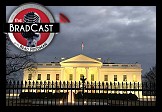 About Some of Trump's
About Some of Trump's Trump Family Corruption Cometh...So Does Our Oppo-sition: 'BradCast' 12/17/24
Trump Family Corruption Cometh...So Does Our Oppo-sition: 'BradCast' 12/17/24 'Green News Report' 12/17/24
'Green News Report' 12/17/24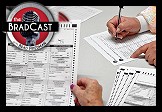 Mistallied Contests Found in OH County, as Oligarchy Rises in D.C.: 'BradCast' 12/16/24
Mistallied Contests Found in OH County, as Oligarchy Rises in D.C.: 'BradCast' 12/16/24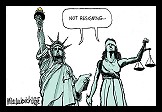 Sunday 'Barrel Bottom' Toons
Sunday 'Barrel Bottom' Toons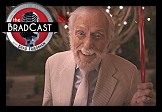 Trump Admits He Can't Lower Grocery Prices (Biden Just Did): 'BradCast' 12/12/24
Trump Admits He Can't Lower Grocery Prices (Biden Just Did): 'BradCast' 12/12/24 'Green News Report' 12/12/24
'Green News Report' 12/12/24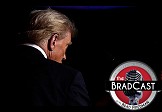 What 'Unprecedented and Powerful Mandate'?: 'BradCast' 12/11/24
What 'Unprecedented and Powerful Mandate'?: 'BradCast' 12/11/24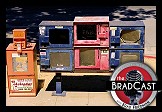 Trump Barely Won Nationally, But Won 'News Deserts' By a Landslide: 'BradCast' 12/10
Trump Barely Won Nationally, But Won 'News Deserts' By a Landslide: 'BradCast' 12/10 'Green News Report' 12/10/24
'Green News Report' 12/10/24 Bad Weekend for Authorit-arianism; Also: To Pardon or Not?: 'BradCast' 12/9/24
Bad Weekend for Authorit-arianism; Also: To Pardon or Not?: 'BradCast' 12/9/24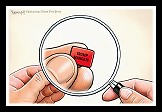 Sunday 'Teeny Tiny' Toons
Sunday 'Teeny Tiny' Toons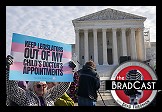 Fox 'News' and GOP Get Their Hateful War on Trans Kids at SCOTUS: 'BradCast' 12/5/24
Fox 'News' and GOP Get Their Hateful War on Trans Kids at SCOTUS: 'BradCast' 12/5/24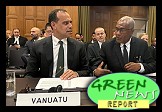 'Green News Report' 12/5/24
'Green News Report' 12/5/24 'Mind Boggles at Potential Corruption' in Trump Scheme: 'BradCast' 12/4/24
'Mind Boggles at Potential Corruption' in Trump Scheme: 'BradCast' 12/4/24 In Defense of Democracy from S. Korea to N. Carolina: 'BradCast' 12/3/24
In Defense of Democracy from S. Korea to N. Carolina: 'BradCast' 12/3/24 Hunter's Pardon: 'BradCast' 12/2/24
Hunter's Pardon: 'BradCast' 12/2/24 How (and Why!) to 'Extend Olive Branch' to MAGA Members: 'BradCast' 11/21/24
How (and Why!) to 'Extend Olive Branch' to MAGA Members: 'BradCast' 11/21/24 Former Prosecutor: Sentence Trump in NY Before Taking Office: 'BradCast' 11/20/24
Former Prosecutor: Sentence Trump in NY Before Taking Office: 'BradCast' 11/20/24 'Bullet Ballot' Claims, Other Arguments for Hand-Counting 2024: 'BradCast' 11/19/24
'Bullet Ballot' Claims, Other Arguments for Hand-Counting 2024: 'BradCast' 11/19/24 Trump Already Violating Law During Transition: 'BradCast' 11/18/24
Trump Already Violating Law During Transition: 'BradCast' 11/18/24 Computer Experts Ask Harris to Seek Hand-Counts After Breaches: 'BradCast' 11/14/24
Computer Experts Ask Harris to Seek Hand-Counts After Breaches: 'BradCast' 11/14/24
 VA GOP VOTER REG FRAUDSTER OFF HOOK
VA GOP VOTER REG FRAUDSTER OFF HOOK Criminal GOP Voter Registration Fraud Probe Expanding in VA
Criminal GOP Voter Registration Fraud Probe Expanding in VA DOJ PROBE SOUGHT AFTER VA ARREST
DOJ PROBE SOUGHT AFTER VA ARREST Arrest in VA: GOP Voter Reg Scandal Widens
Arrest in VA: GOP Voter Reg Scandal Widens ALL TOGETHER: ROVE, SPROUL, KOCHS, RNC
ALL TOGETHER: ROVE, SPROUL, KOCHS, RNC LATimes: RNC's 'Fired' Sproul Working for Repubs in 'as Many as 30 States'
LATimes: RNC's 'Fired' Sproul Working for Repubs in 'as Many as 30 States' 'Fired' Sproul Group 'Cloned', Still Working for Republicans in At Least 10 States
'Fired' Sproul Group 'Cloned', Still Working for Republicans in At Least 10 States FINALLY: FOX ON GOP REG FRAUD SCANDAL
FINALLY: FOX ON GOP REG FRAUD SCANDAL COLORADO FOLLOWS FLORIDA WITH GOP CRIMINAL INVESTIGATION
COLORADO FOLLOWS FLORIDA WITH GOP CRIMINAL INVESTIGATION CRIMINAL PROBE LAUNCHED INTO GOP VOTER REGISTRATION FRAUD SCANDAL IN FL
CRIMINAL PROBE LAUNCHED INTO GOP VOTER REGISTRATION FRAUD SCANDAL IN FL Brad Breaks PA Photo ID & GOP Registration Fraud Scandal News on Hartmann TV
Brad Breaks PA Photo ID & GOP Registration Fraud Scandal News on Hartmann TV  CAUGHT ON TAPE: COORDINATED NATIONWIDE GOP VOTER REG SCAM
CAUGHT ON TAPE: COORDINATED NATIONWIDE GOP VOTER REG SCAM CRIMINAL ELECTION FRAUD COMPLAINT FILED AGAINST GOP 'FRAUD' FIRM
CRIMINAL ELECTION FRAUD COMPLAINT FILED AGAINST GOP 'FRAUD' FIRM RICK SCOTT GETS ROLLED IN GOP REGISTRATION FRAUD SCANDAL
RICK SCOTT GETS ROLLED IN GOP REGISTRATION FRAUD SCANDAL VIDEO: Brad Breaks GOP Reg Fraud Scandal on Hartmann TV
VIDEO: Brad Breaks GOP Reg Fraud Scandal on Hartmann TV RNC FIRES NATIONAL VOTER REGISTRATION FIRM FOR FRAUD
RNC FIRES NATIONAL VOTER REGISTRATION FIRM FOR FRAUD EXCLUSIVE: Intvw w/ FL Official Who First Discovered GOP Reg Fraud
EXCLUSIVE: Intvw w/ FL Official Who First Discovered GOP Reg Fraud GOP REGISTRATION FRAUD FOUND IN FL
GOP REGISTRATION FRAUD FOUND IN FL























 Harri Hursti is coming to Riverside County, home of County Supervisor Jeff "1000 to 1" Stone, he of the now infamous, if ill-conceived,
Harri Hursti is coming to Riverside County, home of County Supervisor Jeff "1000 to 1" Stone, he of the now infamous, if ill-conceived,  Hursti will testify at the commission's March 30th panel at 9am in Palm Desert, CA, at the Palm Desert City Hall, 73-510 Fred Waring Drive.
Hursti will testify at the commission's March 30th panel at 9am in Palm Desert, CA, at the Palm Desert City Hall, 73-510 Fred Waring Drive.




 As
As  San Francisco is considering "upgrading" their voting systems to use Sequoia machines. They are demanding that the company publicly disclose their software source code for all to see. It's called transparency. That's a good thing.
San Francisco is considering "upgrading" their voting systems to use Sequoia machines. They are demanding that the company publicly disclose their software source code for all to see. It's called transparency. That's a good thing. Guest Blogged by
Guest Blogged by  The complaint reports on the violations of the certification requirements under state and federal law, the failure to properly test the machines pursuant to official procedures, the policy of undermining the right to vote on paper ballots, and the disregard of basic auditing principles in conducting the required one percent manual tally.
The complaint reports on the violations of the certification requirements under state and federal law, the failure to properly test the machines pursuant to official procedures, the policy of undermining the right to vote on paper ballots, and the disregard of basic auditing principles in conducting the required one percent manual tally. "We can take a version of Sequoia's software program and modify it to do something different --- like appear to count votes, but really move them from one candidate to another. And it can be programmed to do that only on Tuesdays in November, and at any other time. You can't detect it," Princeton's Professor of Computer Science Andrew Appel
"We can take a version of Sequoia's software program and modify it to do something different --- like appear to count votes, but really move them from one candidate to another. And it can be programmed to do that only on Tuesdays in November, and at any other time. You can't detect it," Princeton's Professor of Computer Science Andrew Appel  Venetis argues that the state certification is in violation of NJ state law which says such systems must "correctly register and accurately count all votes cast," be "of durable construction" to be used "safely, efficiently, and accurately."
Venetis argues that the state certification is in violation of NJ state law which says such systems must "correctly register and accurately count all votes cast," be "of durable construction" to be used "safely, efficiently, and accurately."













